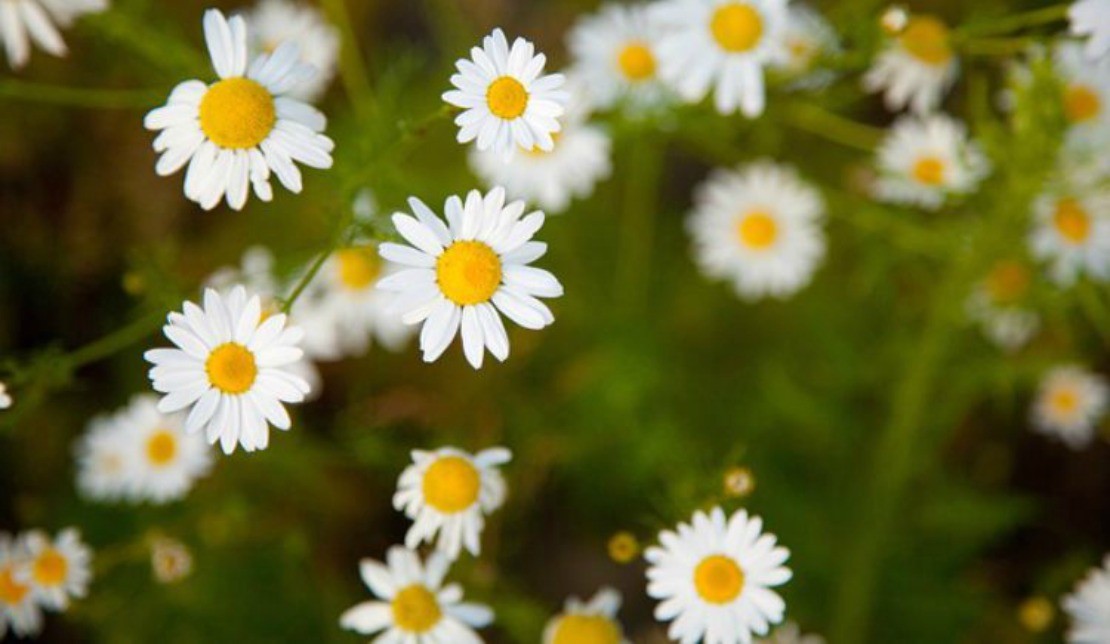
A Family Herb: Chamomile Flower
The lovely little chamomile flower is reminiscent of peaceful sunshine filled days, which speaks to the gentle power of this plant for easing discomfort and bringing happiness. In herbalism the two most commonly used chamomiles are the German chamomile (Matricaria chamomilla syn. Matricaria recutita), which may be the most familiar, and Roman chamomile (Chamaemelum nobile).
Well-known and beloved, chamomile has been employed for thousands of years to ease the woes of humanity. This little plant has long found a happy home in the garden where people could keep it close at hand to help their families with such unpleasantness as fever, painful menstruation and headaches, digestive upsets, and emotional stress. Chamomile’s abundant useful actions make it a wonderful herb choice for every member of the family.
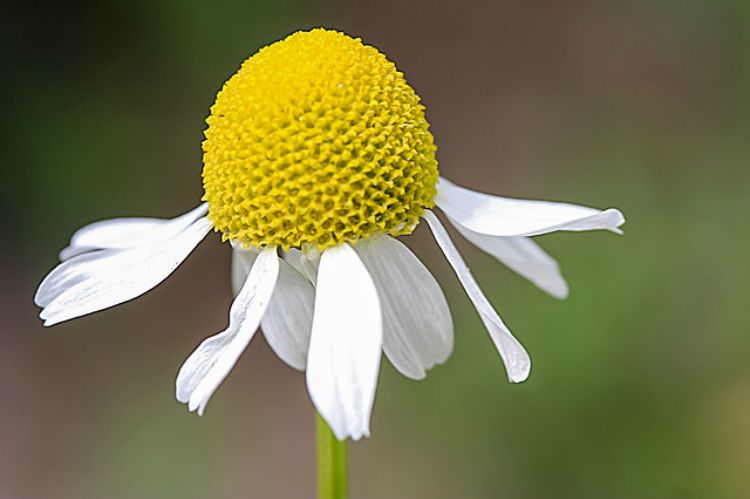
Helpful Chamomile Flower For Families
You may be surprised to discover that the little apple-scented chamomile flower is full of nutrients such as calcium, magnesium, potassium, and B vitamins (Mars, 2015). These nutrients provide nourishment to the nervous system and muscles helping to induce a sense of calm while relieving muscle spasms and tightness.
Perhaps chamomile is best known for its wonderful calming action and indeed, a warm cup of chamomile is like a comforting hug. It is used to ease tension and stress, emotional upset, nervousness, and insomnia. Happily, chamomile is gentle enough for children while still being helpful for adults. Herbalist Matthew Wood considers chamomile to be a remedy for babies, and not just actual babies but for the babyish behavior such as whining, fussiness, and tantrums that all of us are capable of exhibiting at one time or another (Wood, 1997). So when someone in your family is fussy and cranky after a hard day or is coming down with an illness, call on chamomile to ease their distress.
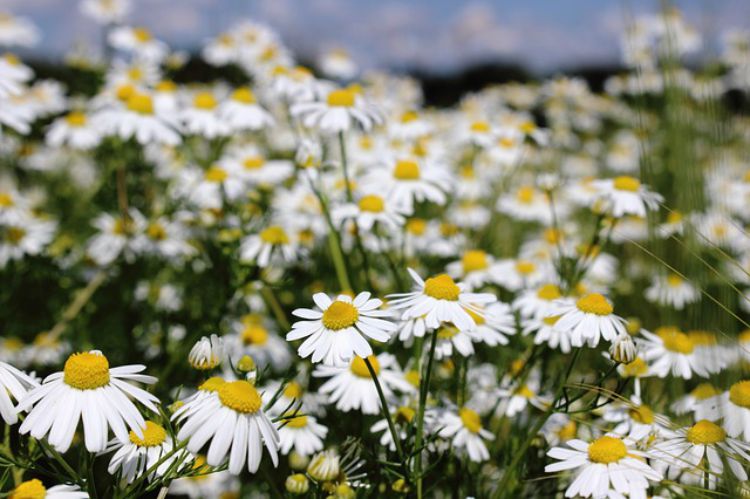
Chamomile is also well-known as a digestive aid. It has bitter constituents which help to gently stimulate healthy digestion. And when a nervous tummy comes to call, chamomile is the perfect herbal friend for easing those digestive woes that arise from upset emotions. In particular, chamomile is used to soothe colicky babies as well as nervous stomach upset that results in diarrhea. This makes chamomile a great herb to turn to when kids (or adults) have a stomach ache due to stress or nervousness, for instance, such as the anticipation over an upcoming event like the first day of school or a big presentation.
Gentle chamomile can also be a soothing helper when people are in pain. Its anti-inflammatory and antispasmodic actions are used to soothe all manner of minor issues in families such as headaches, earache, teething pain, and menstrual cramps while simultaneously relaxing the nervous system and easing situational distress.
What’s more, taken during colds and flus, it can help to ease symptoms and encourage healing sleep as well as reducing uncomfortable fever symptoms such as aches and restlessness. Chamomile is also used to help ease allergies and makes a wonderfully soothing eyewash for allergenic eyes. Finally, chamomile is a lovely vulnerary, anti-inflammatory, and antiseptic herb that can be used for promoting skin health while encouraging healing and soothing issues such as wounds, burns, and rashes.
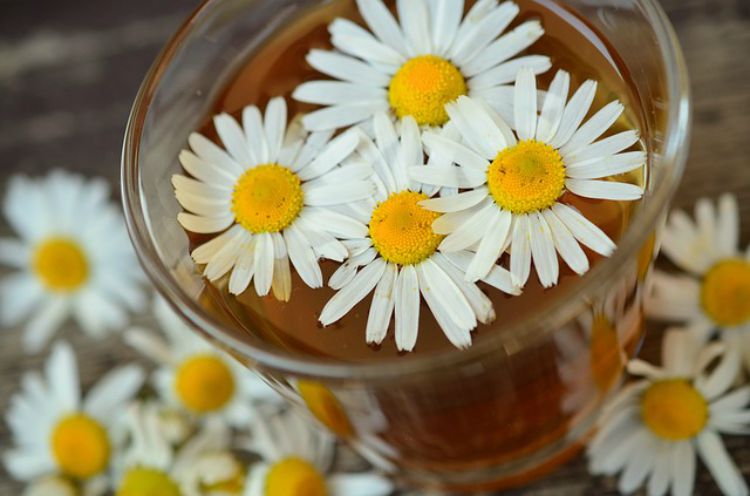
Be Prepared With Chamomile
Life has its many ups and downs so why not be prepared for some of those eventualities by stocking up with chamomile flower remedies? All you need is a supply of chamomile flowers to harness the wonderful properties of this plant. Chamomile makes a wonderfully effective tea that can be used to address most of the issues discussed above. The flowers can also be brewed into a strong tea, by steeping for an hour or more, that is useful in as a compress or in the bath.
A Simple Cup Of Chamomile Tea
1 to 2 teaspoons of the blossoms
1 cup of boiling hot water
Honey to taste – optional
- Place the flowers in a heat-proof container and cover with the hot water.
- Be sure to put a lid on your tea as it is brewing so that the volatile anti-inflammatory essential oil in the chamomile isn’t lost to evaporation.
- Steep the tea for 3 to 10 minutes, strain out the flowers and enjoy.
- The bitter constituents are released in greater amounts during long steeping times. If the tea is too bitter for your family, try sweetening with honey or reducing the brew time.
- This recipe can be easily doubled or even quadrupled for making large amounts of tea at once.
Don’t forget chamomile when everyone is over tired and stressed! Chamomile is a great friend for kids and parents alike especially when parents are being tried by their child’s fussiness because of a cold, colic, or teething. In these cases, everyone can drink a cup of chamomile tea or get into a tub of strong chamomile infusion. If mom is breastfeeding, she can drink chamomile tea prior to nursing baby and the baby will get the benefits of the tea along with mom. It is a great way to relax during those intense times of early motherhood.
Using chamomile as a tincture can be more convenient than brewing up a cup of tea. Learn how to make an alcohol-free glycerite tincture here that your whole family can use for insomnia, stress, and tummy upsets – just use chamomile flower in place of the other botanicals.
A classical glycerite combination for kids is made with chamomile, lemon balm, catnip, and fennel. This soothing combination helps to calm stomach upset and encourage healthy digestion as well as to address respiratory infections. You can make your own by following the glycerite instructions above and using equal parts of these herbs.
Chamomile also combines wonderfully with many other herbs such as lemon balm, mints, catnip, ginger, roses, and fennel. Try blending chamomile with any of these herbs to make tasty teas, glycerites and herbal honeys.
Chamomile Body Care
Chamomile is a wonderful herb to use in skin care. Its anti-inflammatory and vulnerary properties gently yet powerfully help to soothe inflammation while encouraging skin repair. This makes chamomile useful for assisting in healing wounds, scrapes, rashes, blemishes and more. A simple infused oil made with chamomile flower can be used for gently massaging babies and kids before bedtime. This same oil adds wonderful benefits when used as the oil base in making skin salves, sugar scrubs, lip balms, and whipped body butters.
Chamomile flowers can also be used to make water based preparations such as baths and compresses for soothing the skin and calming the spirit. Chamomile in the bath is particularly wonderful for dry itchy skin and rashes.
Milky Chamomile Oatmeal Bath
1 cup oats
1/4 to 1/2 cup chamomile flowers
1/4 cup powdered milk
1 big pinch of lavender blossoms
- Combine everything together in a bowl and stir well.
- Stuff the mixture into a sock, muslin bag, or wash cloth and tie off at the top using a bit of string if needed.
- Fill the tub with the hottest water available and toss the herb bundle in.
- While you wait for the water to cool to bathing temperature, your bundle will steep in the water creating a big tea cup in your bathtub!
- Once the water has cooled, slip in and enjoy your bath. Use the bundle to gently scrub the skin and be sure to give it a good squeeze to get all the herbal goodness into the water!
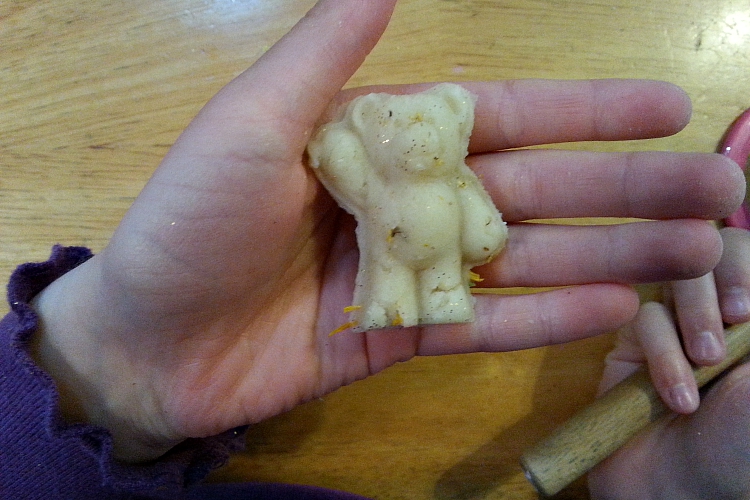
Playtime With Chamomile
Playing with herbs helps kids to make friends with plants. Then when it comes time to use the herb as a remedy the child feels comfortable knowing that this herb is a good friend who is now here to help them feel better!
Chamomile is an easy herb for kids to grow from seed. Help your child find a nice sunny little spot to grow their own little patch of chamomile. (Visit here for fun seed sprouting ideas!) Encourage your kiddo to care for the plants. Children can enjoy the little soft fern-like leaves as they grow and have fun picking the pretty little aromatic blossoms.
For young kids that enjoy play dough, make up a batch of chamomile play dough together for special calming playtime.
Chamomile Play Dough
1 cup flour
1/2 cup salt
1 1/2 teaspoon cream of tartar
1 cup of strongly brewed chamomile tea, strained
1 tablespoon oil
Optional ingredients: chamomile flowers fresh or dried, calendula petals, and glitter
- Invite your child to help measure the flour, salt, cream of tartar, chamomile tea and oil into a pan.
- Carefully stir and heat this mixture over medium-low heat on the stove.
- Stir regularly while the dough forms.
- Once the dough has formed and is no longer sticky remove from the heat to cool before playing. This is a great time to sit with your child and sip a cup of chamomile tea together!
- Now for the fun part! Set up a space with a hard surface (like the kitchen table) for your child to play. During playtime offer the optional ingredients as fun mix-ins to enhance play.
- Store your play dough in an airtight container when not in use. It should last for up to a month before it is time for a new batch!
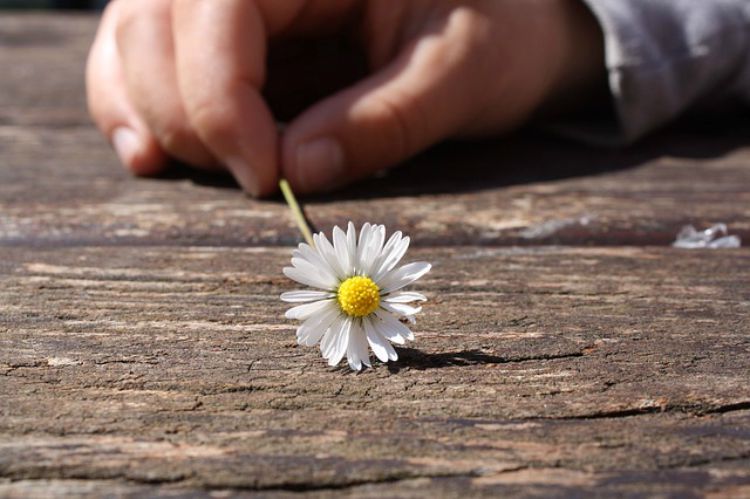
Use Chamomile Safely
Though rare, chamomile can cause allergic reactions especially for people who are allergic to ragweed or other plants in the Asteraceae family. If you will be enjoying chamomile with your child(ren), be sure to visit our post about using herbs safely with kids for guidelines including dosages.
REFERENCES
Humphrey, Sheila. (2003). The Nursing Mother’s Herbal. Minneapolis, MN: Fairview Press.
Mars, Brigitte, and Fiedler, Chrystle. (2015). The Home Reference to Holistic Health and Healing. Beverly, MA: Fair Winds Press.
McIntyre, Anne. (1996). Flower Power. New York, NY: Henry Holt.
Wood, Matthew. (1997). The Book Of Herbal Wisdom. Berkeley, CA: North Atlantic Books.









